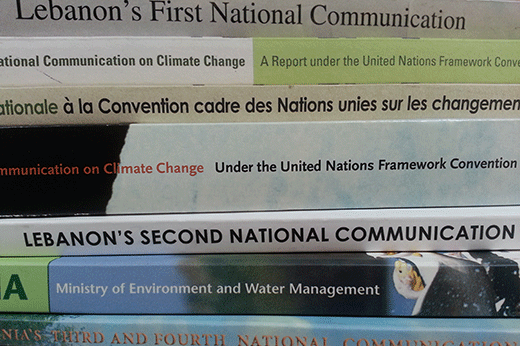
Development of Standard Procedures for Improved Preparation and Communication of GHG Inventories in NCs and BURs (2018)
The Information Matters project, implemented by the Deutsche
Gesellschaft für Internationale Zusammenarbeit (GIZ) GmbH on behalf of
the German Federal Ministry for the Environment, Nature Conservation,
Building and Nuclear Safety (BMUB) has provided support to the Lebanese
Ministry of Environment to develop standard procedures for improved
preparation and communication of GHG inventories in National
Communications and BURs. A series of trainings was conducted in February 2018 for several
departments at the Ministries of Environment, Energy and Water and
Agriculture for over 40 experts.
Management and Information System for Climate Action (MISCA, 2018)
The MISCA interface is a platform developed with the support of the EU-ClimaSouth project in order to track emissions and mitigation progress. A pilot phase includes the energy sector inventory and mitigation since it is the most emitting sector in Lebanon. Through this platform, Lebanese institutions will be able to inform climate change and sustainable development decision-making and enhance the reporting to the UNFCCC. The aim is to expand the platform in the future to all sectors of the NDC. Click here for a short explanatory video: http://www.climasouth.eu/en/node/475.
Lebanon's Second Biennial Update Report (2017)
Lebanon's BURII has been submitted to the UNFCCC in October 2017. The key takeaways from the report are that in 2013, Lebanon emitted 26,285 Gg CO2eq. with the most significant GHG being carbon dioxide, primarily produced from the burning of fossil fuels. The report also comprises information on mitigation actions; in 2013, mitigation measures implemented in the energy sector contributed in reducing emissions by 513,063 tonnes CO2eq., with the expansion of the solar water heaters and the replacement of incandescent lamps inducing the most significant emission reductions. For a quick overview, click on the infographic. The BURII also includes a section on the gaps and constraints of reporting in general and per sector. .
Lebanon’s Third National Communication (2016)
The third and latest national communication report was presented on November 2016. The Third National Communication (TNC) is the most recent update of the developments that have taken place in Lebanon on climate change adaptation, mitigation and reporting levels. The report comprises an updated national greenhouse gas (GHG) inventory for the year 2005 and time-series covering the period from 1994 to 2012, an updated analysis of potential GHG mitigation measures, a vulnerability and adaptation analysis, in addition to policy recommendations.
Lebanon’s First Biennial Update Report (2015)
Lebanon submitted its first Biennial Update Report (BUR) in October 2015, and includes information on greenhouse gas inventory, national progress on mitigation, existing funding needs, and access to technology and capacity building. Lebanon’s BUR went through the ICA process; the technical analysis can be accessed here, and Lebanon’s FSV presentation at the 22nd Conference of Parties (COP22) in Marrakech is available here.
Lebanon's Second National Communication (2011)
In February 2011, Lebanon’s Second National Communication (SNC) report was presented. It analyses the impacts of the country’s projected climatic changes on several economic, social and environmental sectors. The report issues the GHG emissions of each sector along with aggregated figures from 1994-2004. The SNC provides several mitigation measures to reduce GHG emissions, reduce energy demand and increase energy supplies.